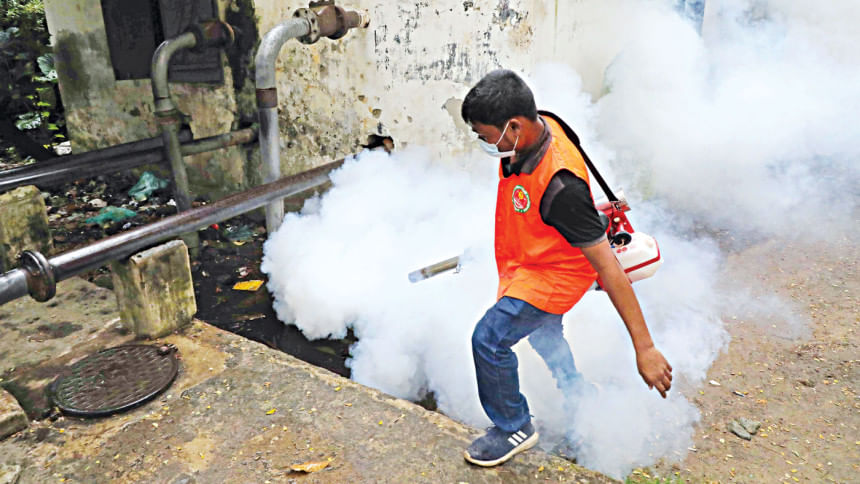Dengue danger not over yet

This type of rain won't wash away mosquito larvae or eggs, so without immediate action, dengue cases in the most vulnerable areas will rise further.
As rain and thunderstorms are expected in various parts of the country over the next few days, experts warn that the dengue season could extend further this year.
The chances of the situation improving in October remain low.
According to the Bangladesh Meteorological Department, rain and thunderstorms, accompanied by gusty winds, are likely in Dhaka, Khulna, and Sylhet divisions, with isolated showers expected in other regions, including Rangpur, Rajshahi, Mymensingh, Barishal, and Chattogram. This weather pattern is expected to continue until Sunday.
Prof Kabirul Bashar, an entomologist at Jahangirnagar University, said the ongoing rainy season might extend the dengue season until December or even January.
"Although the density of Aedes mosquitoes has remained static in the last two weeks, this level is still enough to spread dengue further," he said.
Prof Bashar emphasised the importance of controlling mosquito breeding sites and managing hotspots to curb the spread of the virus. "Necessary steps must be taken to control Aedes mosquitoes to manage the situation effectively."
Entomologist GM Saifur Rahman echoed this sentiment, saying the current pattern of rainfall is highly conducive to Aedes mosquito breeding.
"This type of rain won't wash away mosquito larvae or eggs, so without immediate action, dengue cases in the most vulnerable areas will rise further," he warned.
"We do not expect a reduction in cases this month as the rainy season continues," Saifur added.
He stressed the need for ongoing control measures, citing Singapore as an example where year-round mosquito control programmes have helped reduce dengue cases over time.
"If Bangladesh had implemented active control measures consistently, the situation would be under control," he said. He urged the government to establish a monitoring cell to oversee anti-mosquito activities across the country.
Even a small-scale monitoring system could yield significant results next year, he said.
Saifur said with dengue spreading across the country, there is a risk of further increases in cases and expansion to more areas next year. "The government must take a long-term approach, and setting up a monitoring cell is crucial," he said.
According to the Directorate General of Health Services (DGHS), at least three dengue patients died, and 411 others were hospitalised in the last 24 hours till yesterday morning. This brings the total number of deaths to 237, with total cases reaching 47,461.

 For all latest news, follow The Daily Star's Google News channel.
For all latest news, follow The Daily Star's Google News channel. 








Comments